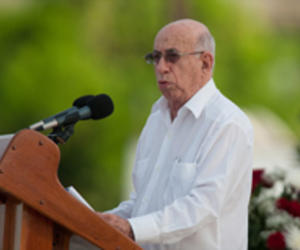Castro Offers a Wave at Cuban Fete, but, Again, No Speech
- Submitted by: manso
- Editorial Articles
- 07 / 26 / 2011

By DAMIEN CAVE.July 26, 2011. CIEGO DE ÁVILA, Cuba — For the second year in a row, Raúl Castro left the rhetoric to his vice president.
Mr. Castro waved to the crowd gathered here on Tuesday in the countryside for the annual rite of a revolutionary holiday.
But as was the case last year, the actual message — calling on Cubans to work harder and accelerate economic reforms — came from a party stalwart who fought at his side during the rebellion.
“We have to definitively break the mentality of inertia,” said Vice President José Ramón Machado Ventura, standing before a sign praising “the victory of ideas.” Instead of emphasizing what they lack, he added, Cubans must “evaluate how much more can be done with what is available.”
The event celebrating the attack on the Moncada barracks in 1953 — the public debut of a rebel movement that toppled President Fulgencio Batista six year later — offered yet another example of the revised socialism that has come to characterize Mr. Castro’s government. While his older brother Fidel used speeches to rally the country with an absolutist moral vision, casting Cuba as hero and the United States as a villain, Raúl Castro has spoken less often and emphasized current needs.
Expert say this is partly a matter of urgency. The world economic crisis plunged Cuba into an abyss not seen here since the years after the Soviet Union collapsed. And even before that, this island of 11 million people had been suffering from decades of economic deterioration. Many Cubans, especially in Havana, say the reforms Raúl Castro has been rolling out since officially taking over in 2008 are at least 20 years overdue.
Nonetheless, the changes in content and approach are significant. The most visible shift so far has been an effort to re-engineer employment. Cuba has opened up nearly 200 professions to limited private enterprise, and in the past year, the government says, the ranks of the self-employed have doubled to 325,000.
The flood of interest is especially visible in Havana. Handwritten signs on creaking colonial doors now advertise items for sale, like baby shoes and pork chops. New private restaurants also seem to be opening almost every day — which, in a country still dominated by centralized control and limited resources, has led to other problems.
Cubans now complain, for instance, that competition is increasing prices for basic items like food and construction materials, which are typically bought on the black market (after being stolen from state distributors).
In his 25-minute speech, Mr. Machado acknowledged some of these obstacles. An octogenarian hunched slightly with age and wearing a white guayabera, he criticized pilfering and the misuse of resources. Addressing a crowd of a few thousand, he called on Cubans to live according to the values that now appear on new billboards featuring Raúl Castro: “Order, discipline and rigor.”
But experts say the government is struggling with a more fundamental question: How much can be changed, and how quickly, to create economic growth without chaos?
“The reform plan has lots of moving, interdependent parts and in many ways the key task is sequencing,” said Philip Peters, a Cuba expert at the Lexington Institute.
Mr. Peters and other analysts said Mr. Castro’s government seemed to recognize that timing was as important as substance. In a surprise move to many Cuba watchers, Raúl, as he is called here, seems to have expanded the role of feedback and adjustments.
“I wouldn’t say he is more of a democrat, but he has a management style that is much more pragmatic,” said Ted Henken, a professor of Latin American studies at Baruch College in New York. “He wants things to work.”
In some cases, that has meant backtracking. “For example, last fall the government announced that by this past spring, the state sector would shed a half-million workers,” Mr. Peters said. Then came public resistance. Now, Mr. Peters said, “the layoffs are proceeding, but slower than that, much slower. This seems to reflect a decision that job creation comes first.”
Mr. Castro’s government has also announced that there will soon be other changes. Political liberties are not included, beyond a promise to let Cubans travel abroad more easily. But Mr. Castro is expected to speak when Parliament opens in August, where he may more fully outline plans for a major change to private property laws, which would allow the purchase and sale of real estate and cars.
Many Cubans seem uncertain about whether to trust that the government will be able to manage all the new laws and impacts.
“It’s complicated” has become the common phrase ending discussions on what amounts to a new social contract in a country where very little is new. Others, however, insist that there is still too much talk and not enough action.
“We’re still in crisis,” said Enrique Suarez, 50, as he prepared for the July 26 festivities.
His friend, Belkis Fernandez, put it just as plainly: “It’s still bad.”
Source: www.nytimes.com/2011/07/27/world/americas/27cuba.html
Comments